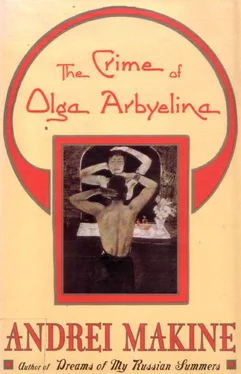This brief explosion of cheerful indignation gave her the energy to climb the staircase at the exit, to cross the square without collapsing onto the seat her eye had spotted. And even to silence the poisonous little voice that was hissing inside her head. "You're a tired old woman: you're putting up a brave front and breaking it off first so your lover doesn't kick you out." She managed to resist this voice and even to answer it back. "You bitch!" It was a young voice, coming from another period of her life, one of her former selves, that had not grown old and often irritated her with these cynical remarks. They were always woundingly accurate. "Little bitch, I'm going to have to take her apart one day…" she repeated, and these words kept at bay the tears of weariness that were already burning her eyelids.
In the train with its almost empty coaches the two days spent in Paris seemed to her very remote, experienced by someone other than herself. Days filled with feverish, excessive words and thoughts. A kind of flight forward, a spiral of errors that then had to be corrected by making further mistaken gestures.
Outside the window a drowsy dusk was slowly spreading. On the platforms of the little stations the sky high above was reflected in the puddles of water, mauveish gray, a wintry sky, you might have said, despite the warmth of that August evening and the dark, heavy profusion of the greenery.
The names of the villages followed one another in the agreeable procession she knew by heart: Cléanty, Saint-Albin, Buissières. From time to time the smell of a fire of fallen branches, burning at the end of a kitchen garden, came in at the lowered window, evoking a gentle life, tempting in its imagined simplicity.
It was in the midst of this deep tranquillity that her child, her son, returned to her thoughts. During those two days in Paris he had been in her at every moment, in every stirring of her soul, but protected, separated from what she was living through. Now he was there and it was he who brought this calm, in which she was slowly catching her breath as if after a long escape… She pictured him already returning next day at noon: with other children of Russian émigrés, from their holiday camp. More than a specific being, she felt him within herself rather like a very physical atmosphere, made up of a myriad delicate elements, a constant vibration of these delicate elements; a throbbing of the blood that must be listened to with a deep instinctive ear, on the alert for the slightest vacillation in this equilibrium. She heard his body; his blood; his life; the silent music, one false note of which could break the rhythm. She heard it, just as, on this return journey she heard the calm of the sky, the silence of the fields… She forgot Paris.
And she remembered how one day in the spring she had been cleaning the windows and he had almost broken one of them, heaving himself up onto the sill of a window that he thought was open because of its new transparency. The glass had resounded vibrantly but resisted. With a rapid movement she had pushed open the two halves of the window, and recognized in the frightened eyes of the child the reflection of her own alarm. It was as if they could hear the shattering of the glass, see a shower of sharp fragments. They knew what that meant for a child like him. "I only wanted to give you a hug…" he said softly and sheepishly climbed down from the window…
As she walked along the platform at Villiers-la-Forêt, where night had already fallen, Olga once more heard in her temples and in her throat (she never knew where it would be hiding) that mocking, aggressive voice she called the "little bitch." The voice told her this calm would be short lived, that new, petty, persistent worries would swiftly erode the serenity of the evening, and that… Olga managed to shake it off by tossing her hair back, as if all the better to feel the coolness of the rain on her brow.
JLt was one evening in September (she was preparing her infusion of hop flowers) that Olga finally realized what memory it was that the painted characters in Li's studio had called up for her. The memory of that masked ball…
During the war this infusion that helped her to sleep also gave her the ulusion of an evening meal or, at any rate, was a substitute for tea. Later on, preparing it was transformed into an evening ritual that, through the repetition of actions that had become routine, put her troubled thoughts to rest, let her live in silent intimacy with herself. She loved this vague hour, outside the measure of time, this floating in repose. The flowers looked like tiny pinecones, their petals swelled up in the boiling water, then cooled down and sank one by one to the bottom of the little copper saucepan. Her gaze was lost in the imperceptible transmutation of the golden liquid, becoming clear again after it was decanted…
That evening the voice of the "little bitch" managed to disrupt the pleasant vacuity of her thoughts. At first Olga was almost pleased to hear the latest reproaches of her persecutrix, so anodyne were the comments. "You aren't consistent even in this stupid ritual. Sometimes you drink your infusion every evening, sometimes a week passes without you remembering. You drink it when you're upset. It's just another trick, a device for banishing unhappiness…" Olga offered no retort, hoping that the reproaches would stop there. But, sensing this hope, the voice started again: "Given the life you've led, and the child that you have, you ought to have become marble long ago, invulnerable to all the little hurts of existence. You ought to be a mater dolorosa… smiling, yes a faint smile of disdain, in defiance of destiny. But look at you, mere words wound you; a remark made by some old madman at the library haunts you for weeks. You mentioned the embroidered slippers to Li and now you picture them each time you put on your own slippers… Mater dolorosa in embroidered slippers. You've missed your vocation!"
This time Olga retorted, "But my life is almost entirely behind me." She knew that this argument silenced the voice of the little bitch when all other reasoning proved fruitless. "Yes. I'm approaching the age when nothing really new can happen to me before my death. No miracles. A highly improbable very last fling? The kind you embark on mainly to prove you still can. Yes, I'm a mater dolorosa in embroidered slippers…"
The little bitch fell silent and in that innermost recess of her mind Olga experienced something of the quiet satisfaction of a person whose superiority has perforce been recognized. At least she could now resume her long drift through the evening. Distractedly she stirred the flowers in the infusion, made ready the drinking bowl and a little strainer. "And now it has to cool…," she thought, relishing the delicious idleness of those minutes.
The boy was already asleep in his room. And the calm and the purity of this sleep seemed to be deepened by the distant chiming of the clock on the church tower in Villiers-la-Forêt. She ended up by matching her thoughts to this nocturnal rhythm. All that remained in these weary thoughts was resignation. Acceptance of this two-pronged house tacked on to the length of the wall of the former brewery where the other emigres lived, which was known as the Caravanserai. The acceptance of her life here in this little town with no special charm; a completely random place and yet predestined; the only one that would take her in after her flight from Paris, her break with Parisian émigré society, and the departure of her husband.
The only place under heaven. This house between the wall of the Caravanserai and the riverbank. She smiled: her place here below.
Holding back the gilded sediment of the flowers with a spoon, she began to pour the infusion into the bowl. She was still smiling, thinking that Li might very well paint her as an old witch mixing her magic potion…
Читать дальше












